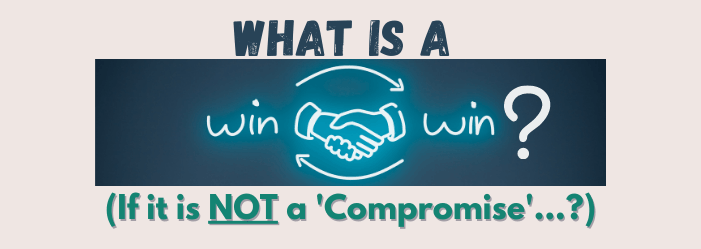What is a 'Win:Win'?
Emma Jenkings • 27 September 2021
(If it is NOT a compromise...?)

What do people say about the success of relationships often is? ‘Compromise’.
Though I would agree that in a long-term relationship, it may feel appropriate at times for each person to make small sacrifices for the benefit of the relationship, compromise is not the ideal result. It even says so in the definition of the word…
Compromise =
1. an agreement or settlement of a dispute that is reached by each side making concessions.
2. the expedient acceptance of standards that are lower than is desirable.
Reading the above definitions of compromise, the phrase that stands out to me most is the concept of accepting something that is ‘lower than desirable’. Who would want to start with that aim in mind?
So, let me unpack what a ‘win:win’ involves.
Firstly, there will be – at least – two different sides to the dispute or conversation, and secondly there will be some desire to get to resolution. It is distinct from other forms of outcome though, in that both parties find a solution that is agreeable to all.
Other types of outcome include:
- Lose:lose
– nobody is happy with the outcome of the conversation. Often it involves all parties giving up on even finding a solution.
- Lose:win
– the other party gets the outcome they wanted but you leave unhappy. Normally this happens when you have given in to them.
- Win:lose
– you are happy with the outcome but the other person is not. They have given in to you.
- Compromise
– neither party is particularly satisfied but not totally unhappy.
So, is a ‘win:win’ outcome, where everyone is satisfied, an unrealistic possibility? No, and I will explain why:
Often when there is a dispute, the core of the problem is that people want different things. Sometimes, the situation escalates because the differences are tackled ineffectively, which results in communication breakdown, or a damage to the trust in the relationship. When this has happened, people tend to lose any motivation to problem-solve together. They may even be at the point where they do not even want to help the other person.
With two people holding this view, it is very difficult to move the issue forward.
This is why mediation is often the forum used for reaching a ‘win:win’. With the mediator being a totally neutral third party, they will seek to understand all parties involved. And, a mediator tends to be a specialist in relationships, communication and conflict, they will have the insight to understand what might be blocking each person from moving forward.
Before parties feel able to problem-solve, they will likely need to feel heard by talking through their perception of what happened and to gain understanding by hearing the different perceptions of others. Possibly, one or both parties may acknowledge what they did which didn’t help matters.
Quite often, by having the discussion and being challenged by the mediator along the way, a party will gain clarity about any assumptions or unrealistic expectations they may have had, and what is actually important to them.
Once the obstacles to problem-solving are removed and the individuals are motivated about what they want to achieve, the focus becomes less about the person and more on the issue. Then, the mediator will uncover what it is that each party really wants to happen, and what might be required to do that.
When seeking a win:win, the aim is not just to find a quick and easy solution, but to creatively discover a solution - or multiple solutions - that accomplishes the core aims of each party. Sometimes what a party is interested in is tangible (like money), but at other times it is a feeling, a word, or an action.
The difference between a ‘win:win’ and a ‘compromise’ is that:
- Compromise involves settling for less and walking away slightly disappointed.
- ‘Win:Win’ outcomes encourage creative solutions that enable both parties to feel acknowledged and satisfied.
Getting to a ‘win:win’ solution is rarely easy when combined with conflict between people, but there are often mutual points of agreement that can be built on, and is often very possible
if you get the right support from a conflict specialist, or if those people become motivated to find a creative solution.
For more information on what is involved in workplace mediation, CLICK HERE.

While gossip can feel good at the time, it rarely makes a beneficial difference to a situation. Conflict coaching is a tool that is becoming more commonly used, as individuals and organise recognise the positive impact only a few conflict coaching sessions have on the individual and the dispute situation.

Closure is a common goal for workplace mediation and conflict coaching.
One or more individuals may be looking to move past what has happened - which is great!
However... sometimes, they want to do the 'moving past' bit without making sure the past is no longer going to negatively impact their future due to unresolved trust, unspoken concerns, or unaddressed assumptions.
In this month's article, I delve into some potential approaches to apply to the balancing act of addressing the past without getting stuck in it.








